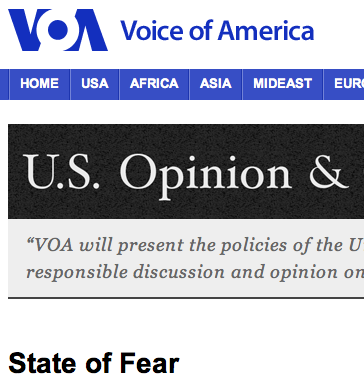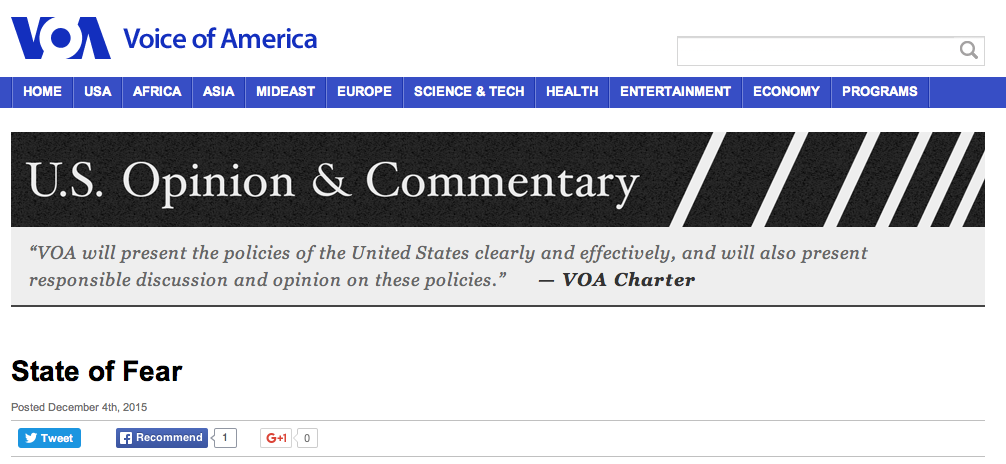BBG Watch Commentary
Everybody who checks and compares international news online knows by now that U.S. taxpayer-funded Voice of America does not quickly update its English news website, particularly on weekends when government workers staffing the VOA newsroom are not there in sufficient numbers to respond quickly to breaking news. Although we don’t like it and don’t approve of it, we can understand why this is happening. There are very few experienced reporters left, as opposed to the huge number of bureaucrats running VOA and its government agency, the Broadcasting Board of Governors (BBG).
The best reporters have left VOA long ago, largely because of bad managers. Many were not replaced. If some were replaced, most of their replacements are poorly-paid contractors and stringers. Employee morale is low. It is near the very bottom of all federal agencies, according to OPM Federal Employee Viewpoint Survey (FEVS).
Why would anyone want to work on weekends in the VOA newsroom if no one cares what news is being put online? Their bosses obviously don’t bother to look at VOA news websites even during business hours. If they did, they might discover that something has not been exactly right with VOA news for a very long time. Perhaps newly appointed VOA director Amanda Bennett and her deputy Sandy Sugawara will look into it, one hopes. Sandy Sugawara was only sworn in on May 2. Amanda Bennett was sworn in on April 18.
When the Voice of America newsroom does not miss some news altogether or is late in reporting others, inexperienced staffers fall for Russian propaganda or sensationalize some news when no one among VOA and BBG editors and executives appears to be paying any attention. Strangely enough, such panic news from VOA usually affects the United States or countries where U.S. foreign policy interests are at stake. One wonders what Ben Rhodes, President Obama’s deputy national security adviser for strategic communication, and Richard Stengel, Under Secretary of State for Public Diplomacy and Public Affairs, think about such VOA performance when it comes to American interests and lives which could be at stake.
Last Sunday, May 1, other international media–BBC, Al Jazeera, and Germany’s Deutsche Welle (DW)–as well as The New York Times and other U.S. news outlets, were reporting that the Iraqi protesters who had penetrated the Green Zone in Baghdad have left and that the situation in the city was returning to normal. BBC, DW, and The New York Times had this news early in the afternoon. Meanwhile, anyone looking at the Voice of America English news website would conclude that Armageddon has come to Iraq and the country was about to implode.
VOA newsroom was not updating its news report on the Baghdad protest for many hours last Sunday even though the situation on the ground in the Iraqi capital had changed drastically for the better. VOA newsroom should have had access to the same information BBC, DW, Al Jazeera, The New York Times and other media had. It is possible that VOA correspondent or stringers were providing the same information as well, but VOA newsroom did not get around to changing the headline until early Monday morning. If one were to believe VOA all day Sunday, the Iraq government was collapsing among chaos. VOA headline screamed: “Baghdad Teetering on Edge as Iraq Plunges Into Political Chaos.” This VOA report had been posted online at 1:10 PM last Sunday, May 1. It was not updated until 12:07 AM Monday.
Baghdad Armageddon was VOA’s top story for hours without any change to its headline. Perhaps not everyone at VOA realizes that news report which may provoke panic and are not updated can be very dangerous.
By Sunday afternoon, BBC had dropped its Baghdad story to the fifth place in the lineup and was reporting already at about 1:00 PM that “Protesters Quit Baghdad’s Green Zone.”
DW was reporting the same news, also at about the same time: “Iraqi Protesters End Green Zone Sit-In – For Now.”
The New York Times was also reporting: “Iraq Protesters Leave Baghdad Green Zone on Cleric’s Order.” Only VOA was still reporting for the next 12 hours that “Baghdad [Was] Teetering on Edge as Iraq Plunges Into Political Chaos.”
Among major international media outlets, only VOA was still reporting protests and chaos.
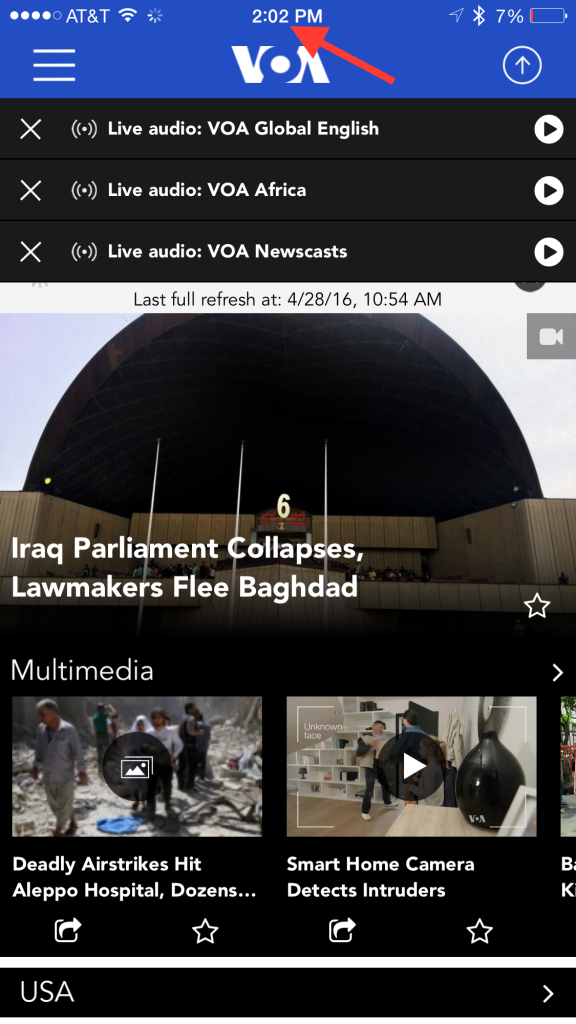
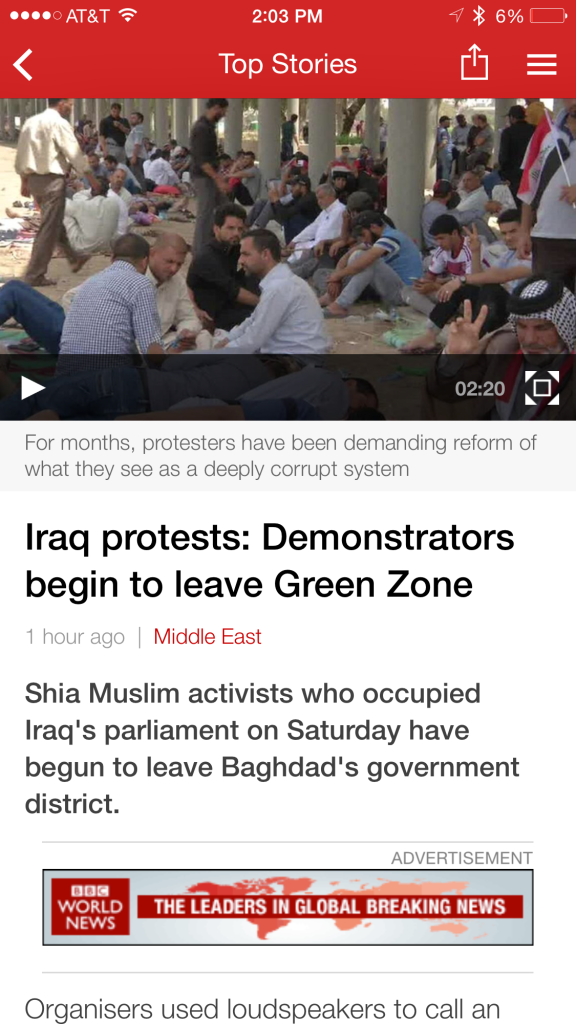
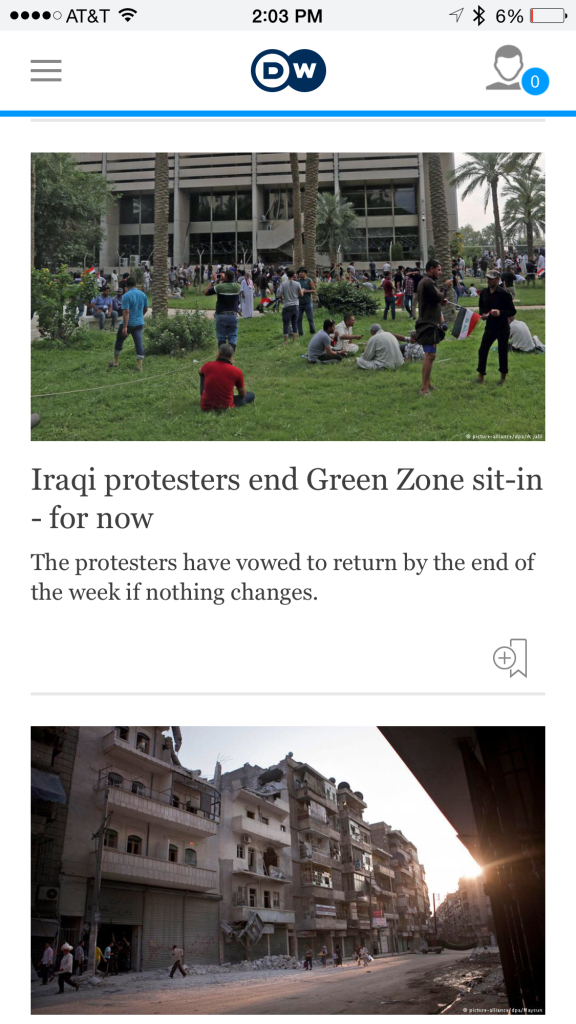
At 9:05 PM Sunday, May 1, VOA is still posting the same panic headline.
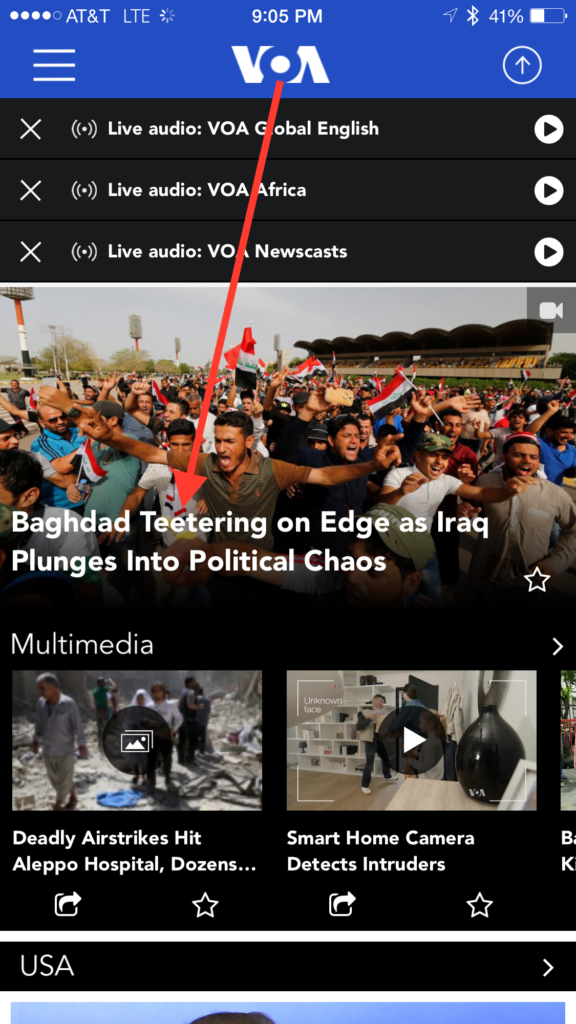
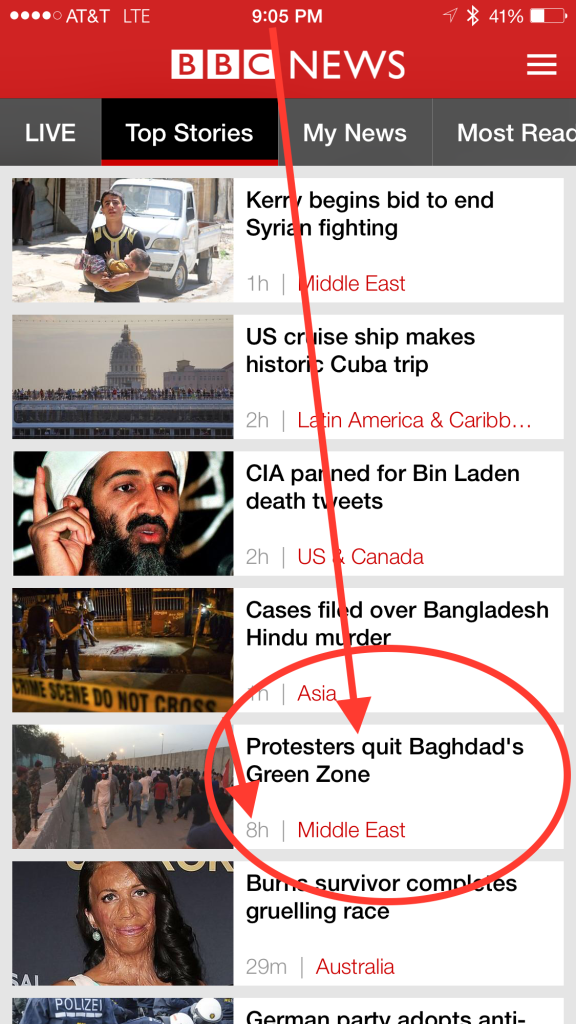
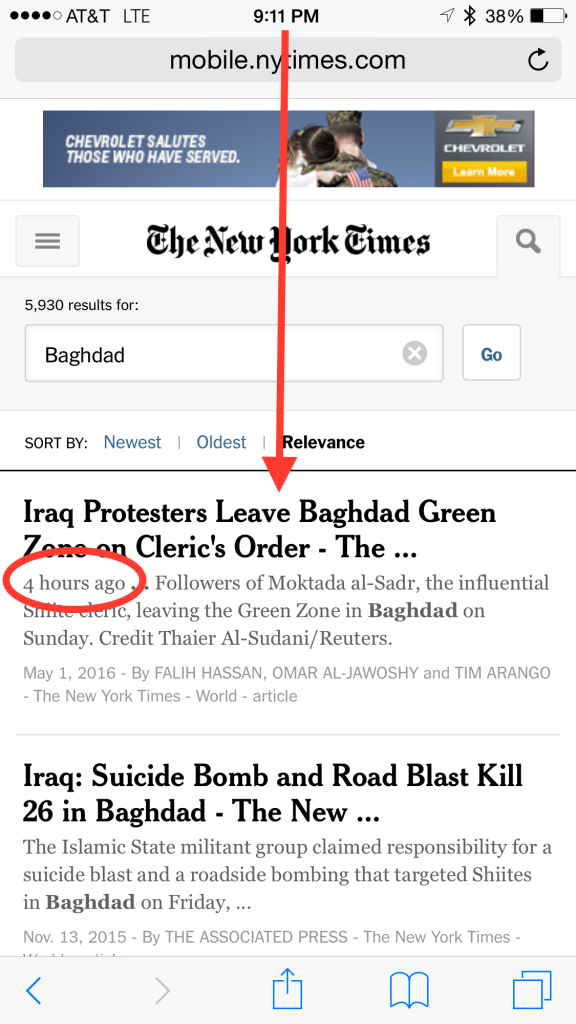
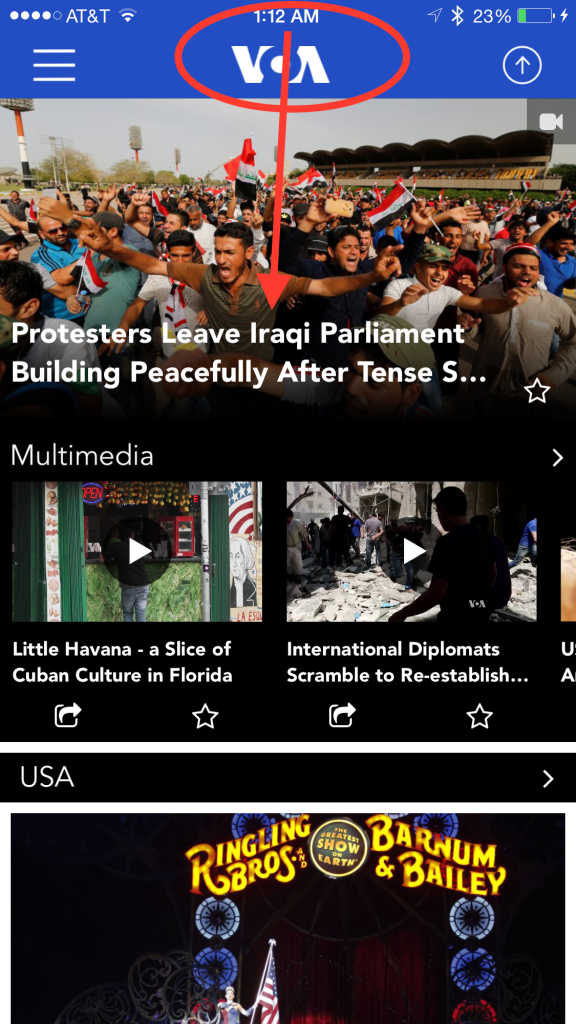
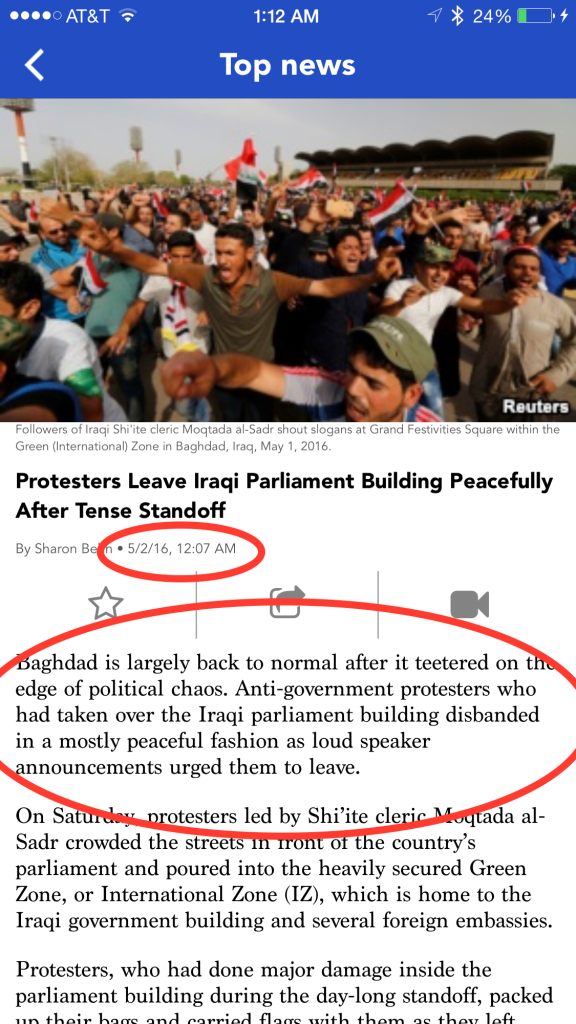
This is, of course, not the first time that VOA has done such panic reporting. Here are some older examples.
Voice of America English headlines paint an image of unpopular and collapsing Ukraine government
May 6, 2014
BBG Watch Commentary
In contrast to other Western broadcasters and its own Ukrainian and Russian services, Voice of America English News headlines and news reports, which appear more like commentaries than news reports, try to paint an image of the Ukrainian government in Kyiv as desperate, unpopular and near collapse. In this respect, VOA English News has become more like Al Jazeera and Russia’s RT.
We welcome comments and more analysis of today’s Ukraine-related headlines and reports from major international media outlets.
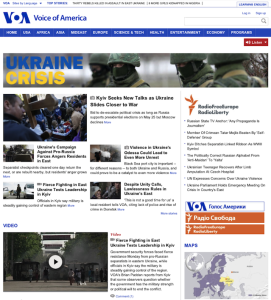
During the last several weeks, we have noticed a definite and disturbing trend on the Voice of America’s main English news website with regard to Ukraine. VOA headlines have become more like op-ed headlines than news headlines. Also, in contrast with reporting by other Western media outlets, including BBC, Deutsche Welle (DW), and Radio Free Europe / Radio Liberty (RFE/RL) which like VOA is also overseen by the U.S. Broadcasting Board of Governors (BBG), Voice of America headlines are far closer to Russia’s RT and Al Jazeera headlines in portraying the Ukrainian government as desperate, unpopular and near collapse.
VOA English News headlines and news reports do not resemble BBC headlines and news reports, but they also do not correspond in any significant degree to VOA Ukrainian Service or VOA Russian Service headlines and news reports which are all more news-focused and neutral.
While these two VOA language services are more in line with RFE/RL, BBC and DW in handling news and headlines, other VOA language services often translate and use VOA English News reports from Ukraine that do not appear to be entirely balanced because they lack resources to produce their own reports. Some of these other services lack the knowledge of the situation in Ukraine and Russia that VOA Russian and VOA Ukrainian journalists have.
VOA Ukrainian Service and VOA Russian Service have not used today any of the VOA English News reports with loaded headlines. They generally avoid these VOA English News reports, which shows that they are more sophisticated about the countries to which they direct their programs, but also that Voice of America lacks good management, coordination and leadership and the senior level.
If the Voice of America Director David Ensor and his deputy Steve Redisch truly agree with these VOA English News headlines and news reporting from Ukraine and believe them to be accurate, balanced and comprehensive then they must insist that most other VOA language services, including VOA Ukrainian and Russian services, also use these headlines and reports. Then all of VOA could become more like Al Jazeera and RT and more unlike BBC, DW, and RFE/RL. This is, of course, not what we would suggest.
Out of five VOA English News Ukraine headlines today, four have a definite negative slant about the Kyiv government. None of BBC, DW, RFE/RL headlines today has that kind of obvious slant.
News headlines by these other news organizations are generally neutral and opinion free, as they should be, or are clearly labeled as commentaries. Their news reports are balanced and generally more comprehensive than VOA reports. These other news organizations are also more up-to-date than VOA in their news reporting.
At the same time, BBC, DW, and RFE/RL headlines and news reports do not minimize at all the seriousness of the situation in eastern Ukraine, but they do not assign most of the blame to the government in Kyiv, as many VOA English headlines and news reports seem to do these days.
We are not sure what caused this rather drastic change in VOA English News reporting/commentaries from Ukraine in recent weeks, although from the beginning of the Ukrainian crisis last year some VOA English news reports also lacked balance and depth, while at the same time VOA English News failed to report on many U.S. reactions to events in Ukraine, including statements from the White House, the State Department, and the U.S. Congress.
While some of VOA English News Ukraine-related headlines and content today appear much more like commentaries or news analyses provided by who are believed to be hired VOA stringers, rather than VOA staff reporters, they are not labeled as such. One VOA stringer consistently provides reports on pro-Russia separatists in eastern Ukraine with hardly any balance.
In contrast to VOA English News reporting from Ukraine, BBC news headlines are much more neutral and BBC news reports are considerably more balanced. BBC news reports are also more substantive, as is Deutsche Welle reporting from Ukraine. In most cases, BBC and DW clearly label views expressed by their staff reporters as commentaries or news analyses.
Some VOA English News reports from Ukraine, while not coming as close to Al Jazeera or RT in terms of anti-Kyiv bias and lack of balance, are more similar in content and emphasis to reports by these two outlets than to reporting by BBC, DW, RFE/RL, or VOA Ukrainian and Russian services. Stringers hired by VOA central English News easily find quotes from pro-Russian locals but seems to have a lot of trouble finding anyone in eastern Ukraine who supports the Kyiv government, does not want to join Russia and does not support pro-Russia separatists.
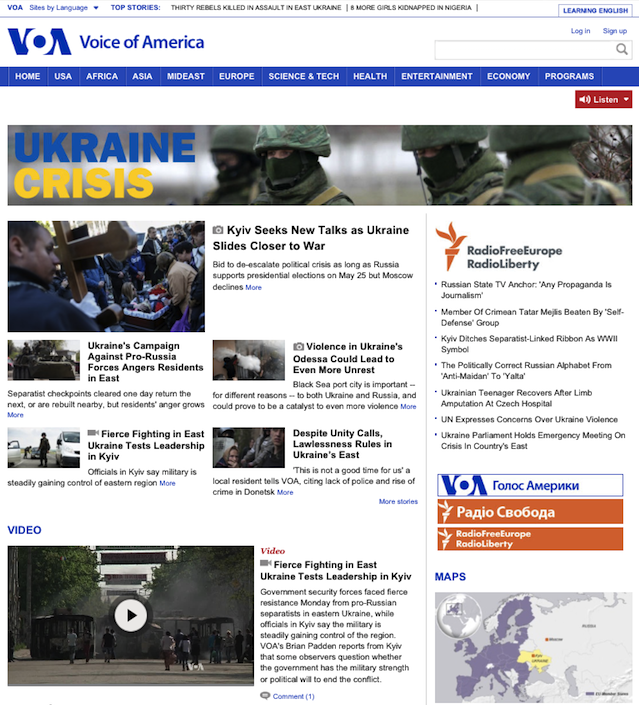
TOP VOA ENGLISH NEWS UKRAINE HEADLINES ON MAY 6, 2014, 2:45 PM EDT
Ukraine Offers Russia New Round of Talks – VOA, May 6, 2014
Ukraine’s Campaign Against Pro-Russia Forces Angers Residents in East – VOA, May 5, 2014
Fierce Fighting in East Ukraine Tests Leadership in Kyiv – VOA, May 5, 2014
Violence in Ukraine’s Odessa Could Lead to Even More Unrest – VOA, May 5, 2014
Despite Unity Calls, Lawlessness Rules in Ukraine’s East – VOA, May 5, 2014
TOP VOA UKRAINIAN SERVICE UKRAINE NEWS HEADLINES ON MAY 6, 2014, 2:45 PM EDT
TOP VOA RUSSIAN SERVICE UKRAINE NEWS HEADLINES ON MAY 6, 2014, 2:45 PM EDT
Киев против Славянска (Kiev against Slaviansk) – VOA Russian Service, May 6, 2014
TOP BBC ENGLISH UKRAINE NEWS HEADLINES ON MAY 6, 2014, 2:45 PM EDT (Note that BBC’s top headline is up-to-date, as are two other BBC Ukraine news headlines, while most of VOA English News headlines are not. RFE/RL and DW have also been updated. Most VOA English News headlines at midday Tuesday are from the previous day.)
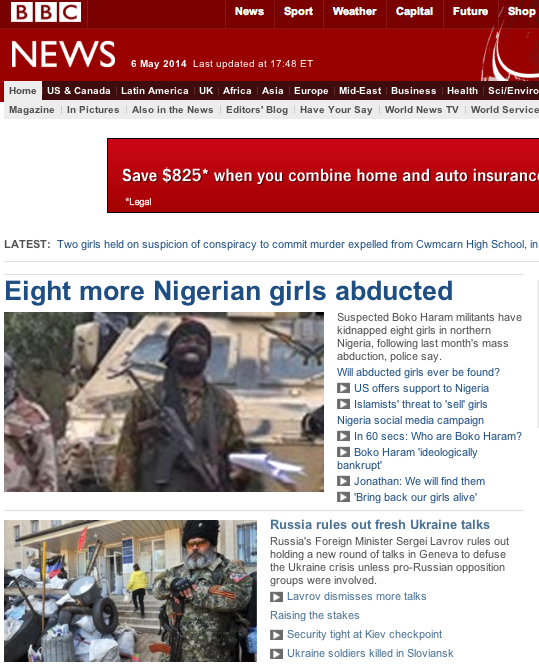
Ukraine crisis: Russia rules out new Geneva talks – BBC, May 6, 2014
Stakes raised in Ukraine crisis, BBC, May 6, 2014
Ukraine crisis: Security tight at Kiev checkpoint – BBC, May 6, 2014.
Ukraine soldiers killed in renewed Sloviansk fighting – BBC, May 5, 2014.
Ukraine crisis: Kiev protesters continue to occupy buildings – BBC, May 5, 2014
TOP RFE/RL ENGLISH UKRAINE NEWS HEADLINES ON MAY 6, 2014, 2:45 PM EDT
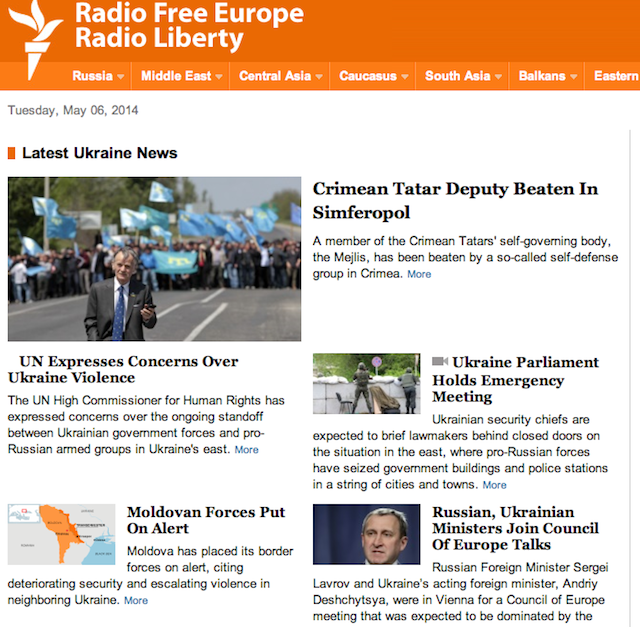
Member Of Crimean Tatar Mejlis Beaten By ‘Self-Defense’ Group – RFE/RL, May 6, 2014
UN Expresses Concerns Over Ukraine Violence – RFE/RL, May 6, 2014
Ukraine Parliament Holds Emergency Meeting On Crisis In Country’s East – RFE/RL, May 6, 2014
Kyiv Ditches Separatist-Linked Ribbon As WWII Symbol – RFE/RL, May 6, 2014
Putin Awards 300 Journalists For ‘Objective’ Crimea Coverage – RFE/RL, May 5, 2014
TOP DEUTSCHE WELLE ENGLISH UKRAINE NEWS HEADLINES ON MAY 6, 2014, 2:45 PM EDT

European diplomats call for further Geneva talks – DW, May 6, 2014
Odessa – next flashpoint on the Black Sea? – DW, May 6, 2014
Separatists killed in Slovyansk fighting: Kyiv – DW, May 6, 2014
Ukraine on edge after Slovyansk battle – DW, May 6, 2014
Opinion: Ukraine on the brink of civil war – DW, May 6, 2014
Let’s review some of today’s VOA English News headlines and compared them to some of the headlines from Al Jazeera and RT. VOA, Al Jazeera, and RT headlines share some similarities and are not at all like headlines from BBC, DW or RFE/RL.
VOA ENGLISH HEADLINES
Fierce Fighting in East Ukraine Tests Leadership in Kyiv – VOA
Ukraine’s Campaign Against Pro-Russia Forces Angers Residents in East – VOA
Despite Unity Calls, Lawlessness Rules in Ukraine’s East – VOA
AL JAZEERA ENGLISH HEADLINES
Ukraine economy choked by political unrest – Al Jazeera
Ukraine: Lies, propaganda and the West’s agenda – Al Jazeera (a particularly powerful anti-U.S., anti-Western, and pro- Kremlin commentary because of its mix of truths, half-truths, and Kremlin propaganda)
Russia questions ‘unusual’ Ukraine election – Al Jazeera
The view from Moscow: What’s the US endgame in Ukraine? – Al Jazeera
RT ENGLISH HEADLINES
Shooting in Ukraine’s Mariupol as self-defense forces fears Kiev resumes assault – RT
‘They need only blood’: Slavyansk woman killed by sniper fire on her balcony (GRAPHIC) – RT
Buses and armed guards: Odessa Jews ready for mass evacuation – RT
###
Voice of America tells world U.S. is in a ‘State of Fear’
December 6, 2015
BBG Watch
Voice of America (VOA) told its international audiences in a homepage headline and in an editorial that because of mass shootings and terrorist attacks Americans live in a “State of Fear.”
A state of fear may be what American mass media and ISIS terrorists, for different reasons, may want Americans to accept as a daily reality of life, but anyone who has seen city streets, shops, theaters, stadiums and other public venues in the United States this 2015 holiday season knows perfectly well that Americans are not living in a state of fear. Life in the United States continues normally after the terrorist shootings in California.
In its editorial, the Voice of America, which lacks any kind of effective management, has seriously mislead foreign audiences by its selective quotes from a few U.S. media outlets and a few obscure “experts.” Voice of America insiders and former VOA journalists have said that in the absence of any kind of leadership, “anything goes” these days at this U.S. government-funded media outlet which is poorly overseen by the bipartisan Broadcasting Board of Governors (BBG). Individual VOA writers and editors can write and post whatever they want, whatever they themselves believe in, and present it as reflecting America and American views in general.
In our view, suggesting that America is in a “State of Fear” simply gives aid and comfort to the enemy, in this case Islamic State terrorists.
If it were true that America is indeed gripped by fear, then VOA would have a journalistic duty to report it. We doubt, however, that a significant number of Americans would agree after reading this Voice of America editorial
1. that this is an accurate reflection of American attitudes as a nation and a daily reality of life in the United States;
2. that posting such Voice of America editorials is how U.S. taxpayers’ money should be spent;
3. that this VOA editorial serves America’s national security interests.
One BBG Watch reader also had this comment:
Another interesting question about the “State of Fear” posting is who wrote it? It’s an opinion piece apparently, but completely unattributed. Is this an official statement?
International audiences have no other option but to assume that this is an official statement offered by the Voice of America.
In this long, poorly-written and confusing editorial, VOA is misleading international audiences and indirectly supporting ISIS propaganda by presenting a false image of the United States to people abroad who may not know how Americans are reacting to terrorism and violence as a nation.
One hopeful sign is that two days after it was published, this Voice of America editorial is showing only 1 (one) Facebook “Like/Recommend.” Voice of America has very little following on social media. Some suspect that it even has to resort to buying “Likes” on Facebook.
A few VOA Newsroom reporters also have objected to any suggestions that they should “counter violent extremism” as undermining their journalistic objectivity. Some of them have fewer than 300 followers on Twitter. Considering that ISIS fanatics generate thousands of social media posts and get thousands of replies daily, it is doubtful that anyone within the U.S. government would bother to ask these VOA reporters to counter terrorist or Putin propaganda.
But VOA still enjoys some appeal in some countries as a semi-official voice of the American people and the U.S government. The “State of Fear” editorial should not have been issued because it is simply not true. There wasn’t even a question mark at the end.
Even if the writer of the editorial was able to find some supportive quotes for his/her thesis in U.S. media, this does not mean that what it suggests to a mostly unsuspecting audience is accurate. American taxpayers expect more from VOA writers who draw hefty government salaries than they do from their own media.
Americans may have gotten used to sensational reporting and views expressed on U.S. television, but they know what their life is like. International audiences which rely on the Voice of America for the most part do not.
VOA has a important duty to get it right, especially when terrorists and their propaganda are involved. ISIS could easily use this VOA editorial in its own propaganda videos to try to prove that they are winning and achieving their goals by killing innocent civilians.
###
VOICE OF AMERICA PRESENTING U.S. OPINIONS – Paid by U.S. Taxpayers
State of Fear
Posted December 4th, 2015
Since Thanksgiving Day, the traditional start of the American holiday season, there have been five times where someone pulled out a gun and started firing into a group of people. Over those nine days, 21 people were killed, 35 wounded by random, unexpected gunfire, according to ShootingTracker.com, a website that records mass shootings in the United States.
Last Friday, this year’s 351st mass shooting took place in Colorado Springs, Colorado, where a white man shot up a Planned Parenthood clinic. Wednesday’s mass shooting in San Bernardino, California was number 353.
Friday, the FBI announced it was investigating the San Bernardino shootings as an act of terrorism.
For a mass shooting to be considered an act of terrorism, a legal threshold that must be met. Page Pate, a criminal defense and constitutional attorney, explains what that is on CNN.com:
Under federal law, the term ‘terrorism’ refers to any violent or dangerous crimes that “appear to be intended” to either (1) intimidate or coerce a civilian population, (2) influence government policy by intimidation or coercion, or (3) affect government conduct by mass destruction, assassination or kidnapping.
The first requirement is that the act constitute a violent crime under federal or state criminal law. In a situation involving a mass shooting, that requirement is easily met. Murder is the most serious, violent state crime on the books. Murder can also be a violation of federal law in certain circumstances. The killing of a federal officer is a federal offense, for example, as is any murder committed on a federal military base or other institution.
The second requirement is where it gets difficult. The crime must ‘appear to be intended’ to intimidate a group of people or the government in some way. Almost any mass murder would necessarily appear as an act intended to intimidate the people present in the area or anywhere nearby, but it wouldn’t necessarily appear as an act intended to intimidate an entire group of people who can be identified as a ‘civilian population.’
What about the previous 352 mass shooting incidents before San Bernardino? Has fear metastasized into terror?
The New York Times asked its readers to share their fears about mass shootings. The response exceeded expectations. More than 5,000 described how they “think about it daily” and “imagine the fear and chaos” that would take place if someone opened fire in their child’s school. One young woman said she finds herself “noting how people look” on the subway and where she could hide if gunfire erupted. A 30-year old man from Texas wrote “Whether it be a crazy terrorist or another crazy guy that thinks I’m a terrorist and wants to take justice in his own hands,” he feels like someone is going to shoot him every day.
Is this fear or terror? Or, are two intertwined?
The Merriam-Webster dictionary defines fear as “to be afraid of something or someone; to expect or worry about something bad or unpleasant.” To be terrorized is defined as “to cause (someone) to be extremely afraid” or “to force (someone) to do something by using threats or violence.”
So, if someone changes their behavior or alter their thought process because they fear guns and the carnage they can wreak, have they been terrorized?
Author Susan Straight recalled her own experience with gun violence that has killed 57 of her relatives, friends and neighbors in the past 26 years, in an op-ed for the New York Times.
Five years ago, my ex-husband called me from a street corner in San Bernardino; he delivered vehicles to car dealers, and was waiting for his company’s van. He said: “I get scared. I wanted you to know where I was, in case I get shot. Out here, I never know. A black guy thinks I’m in a gang, a Latino guy thinks I’m in a gang, a cop thinks I did something. It could be a white guy who just doesn’t like me.” He is 6-foot-4, 300 pounds, an ex-correctional officer, brown skin and black hair graying fast. He said, “Then I get in the van and have to hear the radio turned to Rush Limbaugh, and I know he hates me.”
I listened to him for a long time, the sound of cars and people passing by as he stood there that afternoon, wanting me to know he was alive.
Right after the San Bernardino attack, fear revealed itself on social media. Twitter was awash with condolences and prayers for the victims and families. And then there was backlash of frustration that these shootings keep happening. Emma Green captured the reasons behind so-called “prayer shaming” in The Atlantic.
This is not the first time this idea—that prayer is not enough—has come up in the Twittersphere, or in politics. ‘As I said just a few months ago, and I said a few months before that, and I said each time we see one of these mass shootings, our thoughts and prayers are not enough,’ said President Obama following the October shootings at Umpqua Community College in Oregon. He was not denigrating prayer—in the same speech, he went on to ask God for strength and courage for the victims.
Others have been less nuanced. After Wednesday’s shootings, The Huffington Post quickly rounded up a list of tweets from politicians offering their prayers. ‘In short, basically anyone with a Twitter account shared thoughts and prayers in the immediate aftermath of the latest shooting,’ the reporters wrote. ‘Which is kind of them to do, of course, but probably not enough to stop the next one.’
This cynicism offers a view into just how much religion and politics have changed in the United States. Prayer and political action have a deeply entwined history in America. From civil rights to women’s suffrage, nearly every social-justice movement has had strong supporters from religious communities—U.S. history is littered with images like the one of pastors and rabbis marching on Selma, side by side with political activists.
Prayer and faith help many people deal with things that are beyond their control, like their fears. And there are those who, like Jessica Runck, a writer and actor in Los Angeles, will look fear in the eye, take a deep breath, and keep moving forward:
Having grown up in such a small, quiet town, I’m not used to living in a city that sticks out. Rather than watching the news in rural North Dakota and thinking, ‘That would never happen here,’ I now watch the news and think, ‘I can think of at least 10 places in L.A. that could happen, and two of them are down the block.’
It would be so easy to look at the world right now and close down — to lock up my heart and close my eyes and turn my back. But if I listened to that (very convincing) part of myself, I would never again fly home to see my mother or see a James Bond movie in the theater. And both of those would be tragedies.
The very wise Nelson Mandela said, ‘Courage is not the absence of fear, but the triumph over it.’
The Voice of America editorial, if that is what it should be called, also included three photos from the Reuters news agency.
Here are the captions:
Photo 1 – David Bowdich, assistant director of the Federal Bureau of Investigation’s Los Angeles office, announced that the December 2 mass shooting in San Bernardino is now being investigated as “an act of terrorism,” saying the female shooter had pledged allegiance to a leader of the militant group Islamic State. December 4, 2015 REUTERS
Photo 2 – First-grader Henry Terifay and his sister, fourth-grader Kelly Terifay, wait outside Sandy Hook Elementary School after a shooting in Newtown, Connecticut, December 14, 2012. A shooter opened fire at the elementary school. REUTERS
Photo 3 – An attendee reflects on the tragedy of Wednesday’s shooting attack, during a candlelight vigil in San Bernardino, California, December 3, 2015. REUTERS

